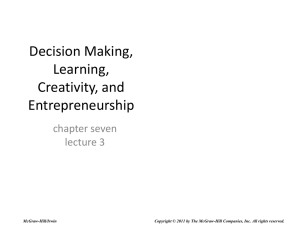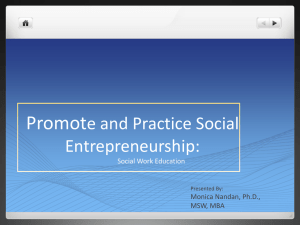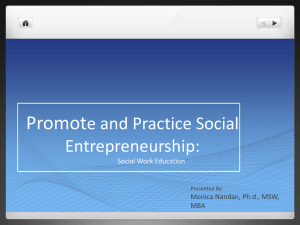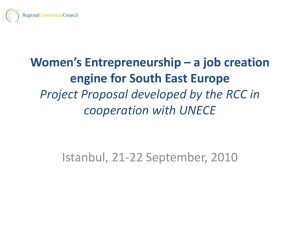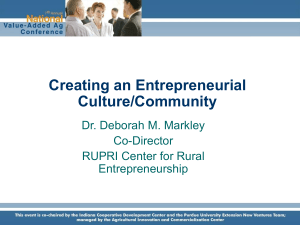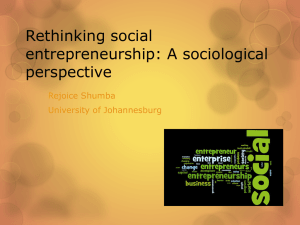Social Entrepreneurship - Duke University`s Fuqua School of Business
advertisement
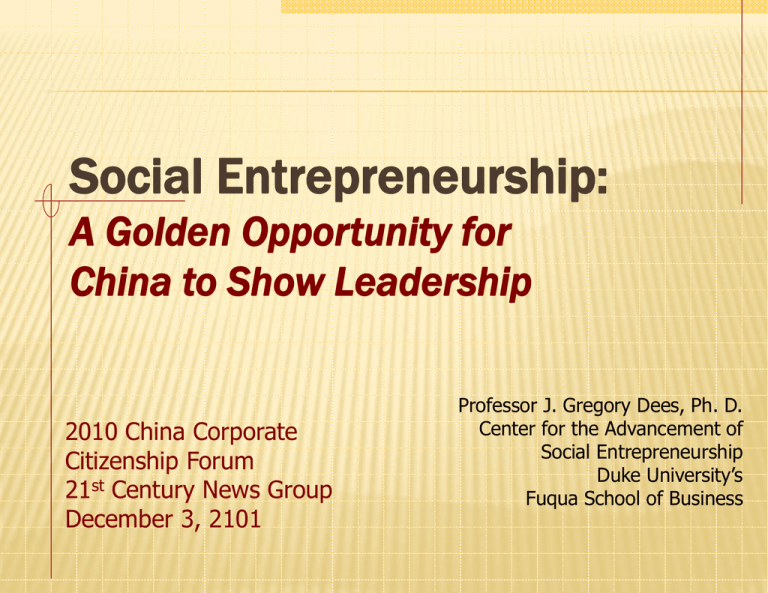
Social Entrepreneurship: A Golden Opportunity for China to Show Leadership 2010 China Corporate Citizenship Forum 21st Century News Group December 3, 2101 Professor J. Gregory Dees, Ph. D. Center for the Advancement of Social Entrepreneurship Duke University’s Fuqua School of Business FIRST: THE OPPORTUNITY China is well positioned to lead the world in creating an environment in which social entrepreneurship thrives and creates maximum benefits for society. Will you take this opportunity and create such an environment? NOW THE SPEECH 1. The Dynamics of Societies 2. The Nature of Social Entrepreneurship 3. How Social Entrepreneurship Helps Societies 4. The Need for a Supportive Environment 5. Returning to the Opportunity THE DYNAMICS OF SOCIETIES ALL SOCIETIES FACE . . . Constant Change Complexity Uncertainties Shocks and Disruptions Unintended Consequences Competing Demands Resource Constraints Resulting in an evolving set of social problems and tensions that need to be addressed RESPONSIVE SOCIETIES WILL . . . Adapt to Changes Be Alert and Flexible Empower Innovators Experiment and Learn Value Resourcefulness Encourage Collaboration Resulting in a capacity to react in a timely and effective way to the evolving social problems Social entrepreneurship contributes significantly to this adaptive capacity THE NATURE OF SOCIAL ENTREPRENEURSHIP Origins of the Term "Entrepreneur" Late 18th century, French economist, Say: Entrepreneurs shift economic resources out of areas of lower and into areas of higher productivity and yield (Value creators) 20th century, Austrian economist, Schumpeter: The function of entrepreneurs is to reform or revolutionize the pattern of production (Innovators) More Recent Theories Professor Peter Drucker, management guru: The entrepreneur always searches for change, responds to it, and exploits it as an opportunity (Opportunity-oriented) Professor Howard Stevenson, Harvard: Entrepreneurship is the pursuit of opportunity without regard to resources currently controlled (Resourceful) “SOCIAL” ENTREPRENEURS When existing conditions in a society fall short of our goals for a prosperous, harmonious, just, healthy society, this creates a social problem as well as an opportunity for progress Social entrepreneurs create social progress by Applying the entrepreneurial orientation In order too move us closer to our social goals in a sustainable way Thus, Social Entrepreneurs . . . Identify and relentlessly purse opportunities to create sustainable solutions to social problems Continuously innovate, adapt, and learn Act boldly, not constrained by resources currently in hand, and Hold themselves accountable for •achieving their intended social impact and •using resources wisely A Few Brief Examples The problems tackled are wide ranging: •Waste Concern in Bangladesh •VisonSpring in India and El Salvador •Canyou Software in China •Latino Community Credit Union in the U.S. Some involve major corporations •M-PESA from Vodafone and Safaricom •BASF and Danone partnering with Grameen HOW SOCIAL ENTREPRENEURSHIP HELPS SOCIETIES SOCIAL ENTREPRENEURSHIP . . . Harnesses private initiative, ingenuity (including business acumen), and investment to solve social problems Enhances the adaptive capacity of a society by decentralizing social problem solving and innovation Serves as a valuable learning laboratory consisting of relatively low risk experiments to find what works and what does not Provides services that create value for both government and businesses, as well as the poor or society as a whole PROBLEM SOLVING VS. CHARITY When we want to help the poor, we usually offer them charity. Most often we use charity to avoid recognizing the problem and finding a solution for it. Charity becomes a way to shrug off our responsibility. Charity is no solution to poverty. Charity only perpetuates poverty by taking the initiative away from the poor. Muhammad Yunus, social entrepreneur Winner of Nobel Peace Prize in 2006 from his book Banker to the Poor, 1999 THE NEED FOR A SUPPORTIVE ENVIRONMENT BASIC ECOSYSTEM NEEDED FOR SUCCESS Talent Flows Culture/Media Support Financial Support Capacity Building Policy Support Social Entrepreneurs RETURNING TO THE GOLDEN OPPORTUNITY FOR CHINA WHAT IS THE OPPORTUNITY? Social entrepreneurship has been rising in popularity, but no society has fully developed a strong supportive ecosystem yet As a result, many social entrepreneurs have difficulty scaling their innovations and impact China has the opportunity to learn from efforts in other nations, begin fresh, and draw on the skills built in the last two decades Social entrepreneurship can help China build the bridge from prosperity to harmony WHAT DOES THIS MEAN FOR YOU? Corporate Leaders: Look for opportunities to use your business skills, technological know-how, operating capacities, and financial resources to improve the effectiveness of social entrepreneurs Government Leaders: Remove barriers and create appropriate legal structures and regulations to empower social innovation and capture lessons learned Philanthropists and Investors: Focus your resources in a disciplined way on supporting social entrepreneurs and capturing knowledge learned WHAT DOES THIS MEAN FOR YOU? University Professors and Leaders: Educate students to be effective social entrepreneurs, conduct research to draw out the lessons learned, advise public and private leaders on policies and strategies, and incubate new social ventures that emerge out of the universities Media Leaders: Cover social entrepreneurship seriously (not just as “feel good” stories), as you would business entrepreneurship, help to identify the successes and draw lessons from the failures, highlight companies, individuals, and civil servants who are finding creative and disciplined ways to engage with and support social entrepreneurs THANK YOU AND GOOD LUCK WITH YOUR OPPORTUNITY!

